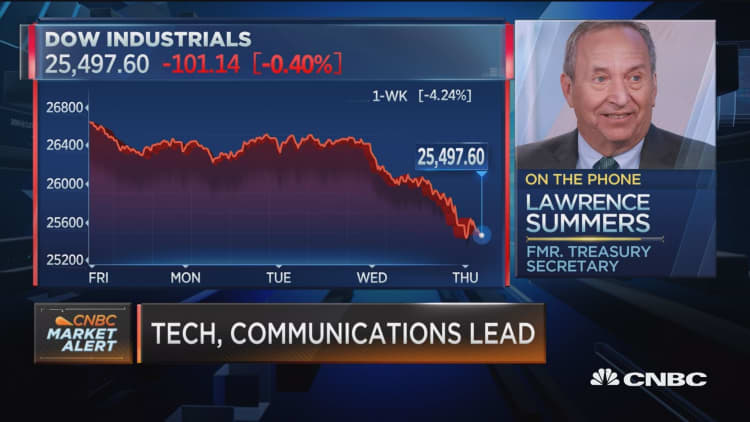
President Donald Trump's "totally inappropriate" attack on the Federal Reserve puts central bankers in a box, economist Larry Summers said Thursday.
"When the president of the United States blatantly politicizes the Fed, he makes it much harder for the Fed to ease [monetary policy] if they think that's what's appropriate," the Treasury secretary in Bill Clinton's administration told CNBC.
"No responsible central bank wants to look like it's bending to political pressure," he added. "It will damage its reputation and credibility if there's an appearance of bending."
Trump called into Fox News on Wednesday night and upped the ante on his criticism of the Fed under the leadership of Chairman Jerome Powell for increasing interest rates too quickly. "The Fed is going loco," Trump said.
On Thursday, Trump said Powell is making a mistake with monetary policy but added that he does not intend to fire the Fed chairman.
"Actions like the president's are counterprodutive in the president's terms," said Summers, Harvard University president emeritus and formerly an economic advisor in Barack Obama's White House.
Powell's remarks last week about monetary policy being a "long way" from neutral signaled a possibly more aggressive path for rate hikes, sparking a spike in bond yields to seven-year highs and applying pressure on the stock market.
The Fed last month raised the federal funds rate, which banks charge each other for overnight loans, for the third time this year. Another increase is expected in December. Post-meeting projections indicated central bankers were likely to take that benchmark rate to 3.4 percent before pausing.
Summers, a strident critic of Trump, favors the kind of low rate policy that the president wants to preserve, but for different reasons.
"For a long time now, I believed that the dangers are probably more on the tightening side than they are of staying easy for too long," Summers told "Squawk on the Street," saying he's worried the "sugar high" from Trump's corporate tax cut and other stimulative policies won't be able to prop up the economy forever.
Trump wants to keep rates low because he fears further hikes could derail the stronger economy that's been seen since he's been in the White House. The president and his advisors have argued the pace of growth is not fueling problematic inflation, and therefore there's no reason for the Fed to act.
Larry Kudlow, the president's top economic advisor, said earlier Thursday in a separate interview on CNBC that Trump "is not dictating policy to the Fed."
"The president has his own views. He's stated them many times," said Kudlow, a CNBC commentator before joining the White House. "We all know the Fed is independent."


